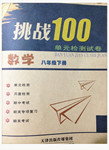题目内容
七选五
根据短文内容,从短文后的七个选项中选出能填入空白处的最佳选项。选项中有两项为多余选项。
Many parents would like to teach their children English at home, but don’t know how to start. It doesn’t matter if your own English is not perfect. The most important thing is that you give your children lots of encouragement and praise. ____1____ They will need some time to learn the language.
Make it a rule
Try to do certain activities at the same time every day. ____2____ For example, you could read an English story with your children before bedtime. Repetition (重复) is important — children often need to hear words many times before they say them themselves.
Playing games
____3____ Cards are a great way to teach words and there are many different games which you can play with cards, such as Memory and Happy Families.
Using everyday situations
The advantage of teaching English at home is that you can use everyday situations to practice the language naturally. For example:
●Talk about clothes when your child is getting dressed ("Let’s put on your blue socks", etc.).
●____4____ When you go to the supermarket, give your child a list of things to find.
Using songs
Songs are a really good way to learn new words. Songs with actions are especially good for very young children because they are able to join in. ____5____
A. Fifteen minutes is enough for very young children.
B. Children learn naturally when they are having fun.
C. Teach food words when you are cooking or going shopping.
D. The actions often show the meaning of the words in the song.
E. With younger children, there is no need to teach grammar rules.
F. Don’t worry if your child doesn’t start speaking English immediately.
G. Children feel more comfortable and confident when they know what to expect.
 挑战100单元检测试卷系列答案
挑战100单元检测试卷系列答案Dear Amy, My in-laws are all the products of failed marriages, so there are blood relatives and step relatives to deal with on both sides of the aisle. For years, my in-laws have told my children that my wife’s stepmother’s grandchildren are their cousins. This alone is not true, since these kids are only involved in our lives due to marriage. I just keep talking to my kids and explaining to them the way the family tree works and that these kids are not their cousins. At one point, my oldest son got mad and told one of these kids that he was not his real cousin, and then my in-laws confronted my son about what he said. They were apparently upset about it. Amy, I am not going to create a world that does not exist. They are stuck on taking in these kids that have zero actual blood relation to them at all. I stand my ground on this, and my wife just thinks that I am being an ass. Your thoughts? Disturbed Dad |
Disturbed Dad, Before you spend the rest of your life carefully studying a family tree at every potluck dinner, remember that “family” isn’t some exclusive club that you get to join by having two or more of the same biological relatives. People in highly functioning and inclusive families will tell you that all you have to do to be a part of any family is to be considered part of the family. This means being included, regardless of your biological status, and reveling in relationships that are auntlike, grandparent-like or cousinlike. It is wise to explain truthfully all of these many and varied relationships to your children, but to use loaded terms like “real family” only underlines your emotional ignorance about relationships. Your in-laws are doing a wonderful thing accepting these children, so put down the genealogy chart and apologize. After all, if we follow your logic, then your in-laws shouldn’t be accepting you as family either; you aren’t related to them by blood, so you aren’t their “real family.” The good news is, if you continue to treat your wife’s family this way, you won’t have to worry about keeping the blood relatives and the step-relatives in this family straight — given your lack of good manners, these family members might disregard you in favor of someone who is more open, accepting and inclusive. Amy |
1.The Disturbed Dad’s in-laws were upset because _______.
A. they all had failed marriages B. they knew of the Dad’s thoughts
C. one of the grandsons got mad D. some kids had no blood relation
2.What’s Amy’s attitude towards the Disturbed Dad’s opinion?
A. Objective. B. Negative.
C. Doubtful. D. Cautious.
3.Amy may agree that _______.
A. the Dad shouldn’t be narrow-minded about the family tree
B. it’s necessary to consider biological relationships in a family
C. the Dad shouldn’t be accepted as family by their in-laws
D. it’s good news for the family members to disregard the Dad


